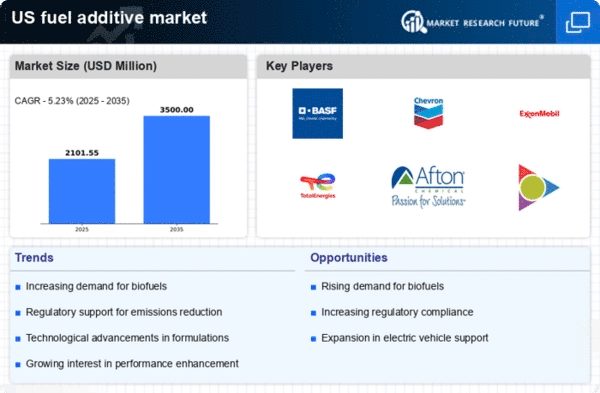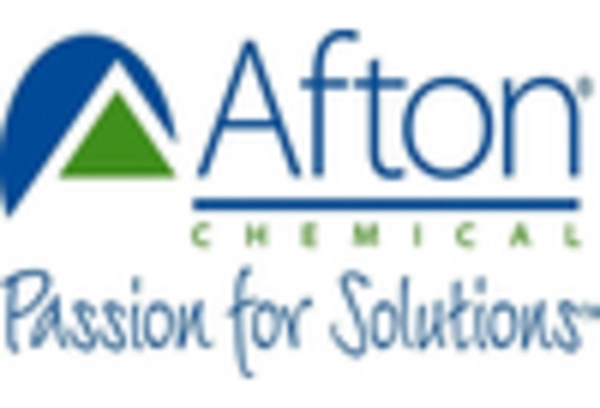The fuel additive market exhibits a dynamic competitive landscape characterized by innovation and strategic partnerships. Key players such as Chevron (US), ExxonMobil (US), and Afton Chemical (US) are actively shaping the market through their operational focus on sustainability and technological advancements. Chevron (US) emphasizes its commitment to reducing carbon emissions, which aligns with the growing demand for environmentally friendly products. ExxonMobil (US) continues to invest in research and development, aiming to enhance fuel efficiency and performance. Afton Chemical (US) leverages its expertise in chemical formulations to create tailored solutions for various fuel types, thereby enhancing its competitive positioning.The market structure appears moderately fragmented, with several players vying for market share. Companies are increasingly localizing manufacturing and optimizing supply chains to enhance operational efficiency. This trend not only reduces costs but also allows for quicker response times to market demands. The collective influence of these key players fosters a competitive environment where innovation and customer-centric strategies are paramount.
In October Chevron (US) announced a partnership with a leading technology firm to develop advanced fuel additives that improve engine performance while minimizing emissions. This strategic move underscores Chevron's commitment to sustainability and positions the company as a leader in the transition towards greener fuel solutions. The collaboration is expected to yield innovative products that cater to the evolving preferences of environmentally conscious consumers.
In September ExxonMobil (US) unveiled a new line of fuel additives designed to enhance fuel economy and reduce engine deposits. This launch reflects ExxonMobil's ongoing investment in R&D and its focus on delivering high-performance products. The introduction of these additives is likely to strengthen the company's market presence and appeal to consumers seeking efficiency and reliability in their fuel choices.
In August Afton Chemical (US) expanded its product portfolio by acquiring a smaller competitor specializing in biofuel additives. This acquisition not only broadens Afton's offerings but also enhances its capabilities in the rapidly growing biofuel segment. The strategic importance of this move lies in Afton's ability to leverage its existing distribution channels to introduce these new products to a wider audience, thereby increasing market penetration.
As of November the fuel additive market is increasingly defined by trends such as digitalization, sustainability, and the integration of artificial intelligence. Strategic alliances among key players are shaping the competitive landscape, fostering innovation and enhancing product offerings. Looking ahead, competitive differentiation is likely to evolve from traditional price-based competition towards a focus on technological advancements, sustainability, and supply chain reliability. Companies that prioritize innovation and adapt to changing consumer preferences will likely emerge as leaders in this evolving market.

















